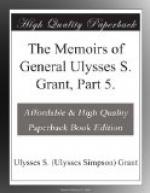Smith, who was coming up from White House, was also directed to march directly to Cold Harbor, and was expected early on the morning of the 1st of June; but by some blunder the order which reached Smith directed him to Newcastle instead of Cold Harbor. Through this blunder Smith did not reach his destination until three o’clock in the afternoon, and then with tired and worn-out men from their long and dusty march. He landed twelve thousand five hundred men from Butler’s command, but a division was left at White House temporarily and many men had fallen out of ranks in their long march.
Before the removal of Wright’s corps from our right, after dark on the 31st, the two lines, Federal and Confederate, were so close together at that point that either side could detect directly any movement made by the other. Finding at daylight that Wright had left his front, Lee evidently divined that he had gone to our left. At all events, soon after light on the 1st of June Anderson, who commanded the corps on Lee’s left, was seen moving along Warren’s front. Warren was ordered to attack him vigorously in flank, while Wright was directed to move out and get on his front. Warren fired his artillery at the enemy; but lost so much time in making ready that the enemy got by, and at three o’clock he reported the enemy was strongly intrenched in his front, and besides his lines were so long that he had no mass of troops to move with. He seemed to have forgotten that lines in rear of an army hold themselves while their defenders are fighting in their front. Wright reconnoitred some distance to his front: but the enemy finding Old Cold Harbor already taken had halted and fortified some distance west.
By six o’clock in the afternoon Wright and Smith were ready to make an assault. In front of both the ground was clear for several hundred yards and then became wooded. Both charged across this open space and into the wood, capturing and holding the first line of rifle-pits of the enemy, and also capturing seven or eight hundred prisoners.
While this was going on, the enemy charged Warren three separate times with vigor, but were repulsed each time with loss. There was no officer more capable, nor one more prompt in acting, than Warren when the enemy forced him to it. There was also an attack upon Hancock’s and Burnside’s corps at the same time; but it was feeble and probably only intended to relieve Anderson who was being pressed by Wright and Smith.
During the night the enemy made frequent attacks with the view of dispossessing us of the important position we had gained, but without effecting their object.




